大学英语全新版第一册教案
- 格式:doc
- 大小:491.50 KB
- 文档页数:88
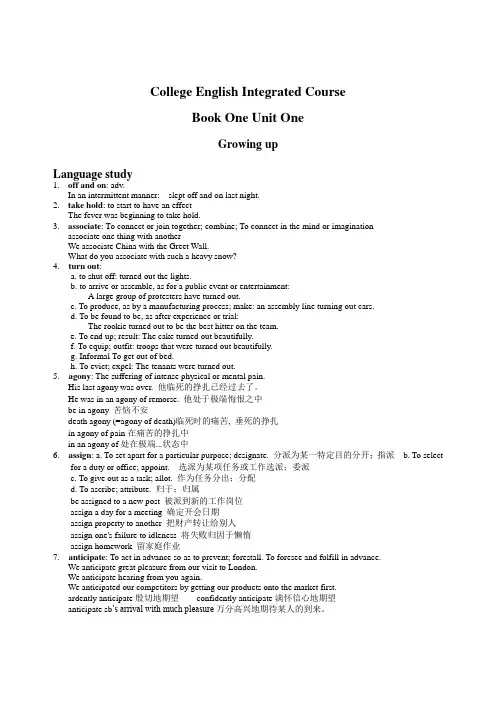
College English Integrated CourseBook One Unit OneGrowing upLanguage study1.off and on: adv.In an intermittent manner: slept off and on last night.2.take hold: to start to have an effectThe fever was beginning to take hold.3.associate: To connect or join together; combine; To connect in the mind or imaginationassociate one thing with anotherWe associate China with the Greet Wall.What do you associate with such a heavy snow?4. turn out:a. to shut off: turned out the lights.b. to arrive or assemble, as for a public event or entertainment:A large group of protesters have turned out.c. To produce, as by a manufacturing process; make: an assembly line turning out cars.d. To be found to be, as after experience or trial:The rookie turned out to be the best hitter on the team.e. To end up; result: The cake turned out beautifully.f. To equip; outfit: troops that were turned out beautifully.g. Informal To get out of bed.h. To evict; expel: The tenants were turned out.5. agony: The suffering of intense physical or mental pain.His last agony was over. 他临死的挣扎已经过去了。
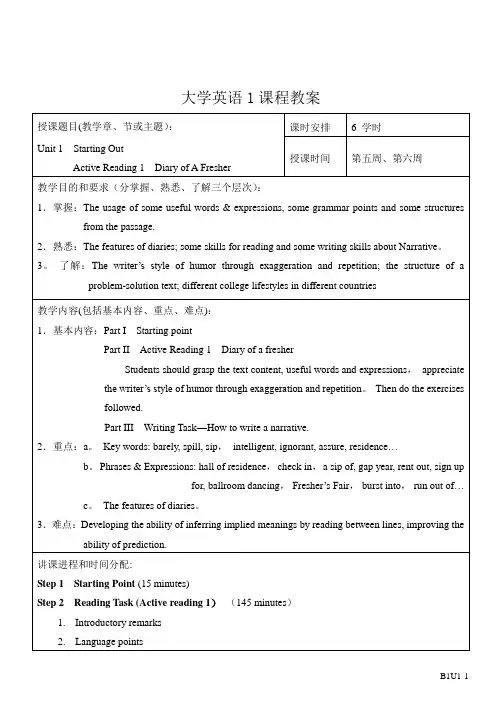
大学英语1课程教案Unit 1 Starting OutTeaching Content: Diary of A FresherLesson Type: Intensive Reading (New Standard College English Book 1)Total Time:4.5 HoursClass/Object: Freshman (the first term)Teaching Procedures:Step 1Starting Point(15 mins)1。
What do you expect to learn in the university?2.Work in pairs. Look at the photo of a university. Choose words to describe it。
And then think of words to describe your own college.3. Work in pairs. Brainstorm college education objectives and what are important to you。
☐finding a girlfriend / boyfriend☐studying hard and learning a lot☐meeting people and making friends☐getting a good job when you graduate☐having fun☐growing up and becoming independent☐going to parties☐doing lots of sport☐reading widely☐learning new skills and having new experiencesStep 2Introductory remarks (10 mins)How to write a diary in English1. Format:a. Write down the date, the day and the weather on the first line。
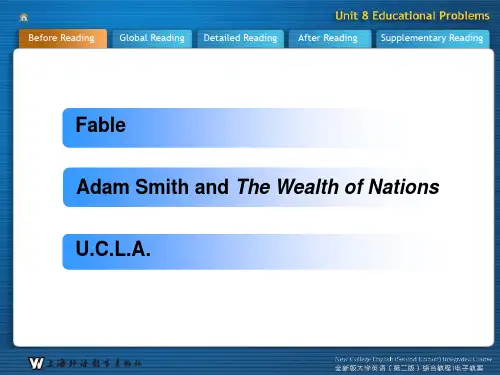
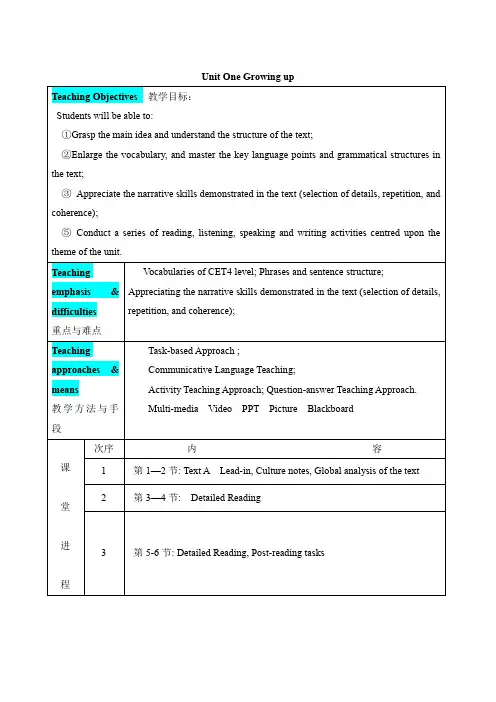
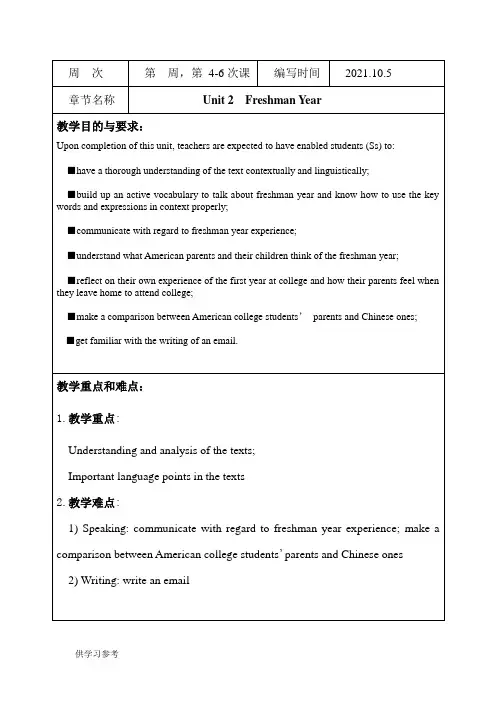
教学组织〔含课堂教学内容、教学方法、辅助手段、师生互动、时间分配、板书设计等〕:教学内容:Part ⅠText:All Grown Up and Still in TowPart ⅡReading 1 Learning to Make a DifferencePart ⅢReading 2 Universities Encourage New Students to Go It AlonePart ⅣTheme-related Language Learning Tasks教学方法: eclecticismA theme-based and comprehensive from-input-to-output training approach辅助手段: Multi-media时间分配:This unit is designed for a six-to-eight period class. In each of the periods, certain tasks are to be completed.注:Reading 2和Opener一起处理,主要基于以下考虑:1)使用本书的学生应该都是新生,Reading 2是关于中国高校新生报到,内容非常贴近他们的生活;2)和主课文相比,Reading 2的语言较直接、明了。
这样由浅入深的安排更容易帮助学生进入学习状态。
Teaching ProceduresPart One: Opener1.Introduce the topic to the class either in English or Chinese.2.Play the song in Opener and ask Ss whether they know it or not.3.Tell Ss the background information about the song and guide them to read the words ofthe song.4.Play the song again and ask Ss to complete the task in Pair work.5.Play the song for the third time and ask Ss to discuss the questions in Groupwork.。
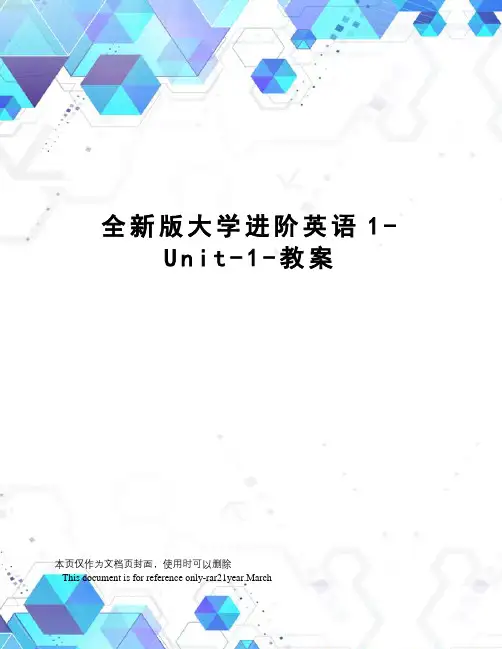
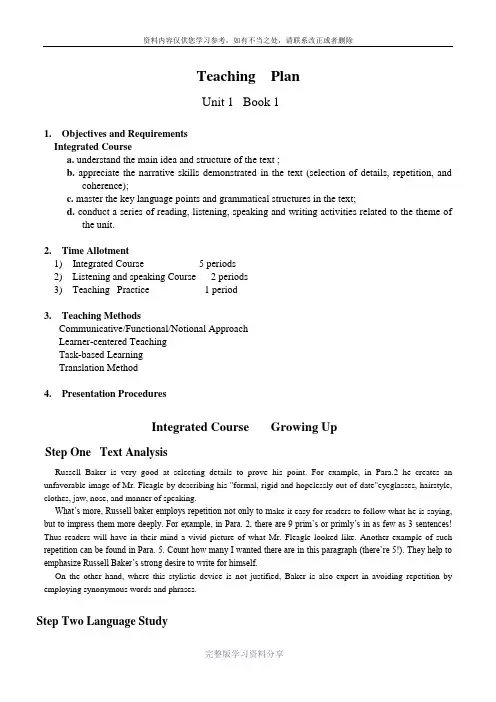
Teaching PlanUnit 1 Book 11.Objectives and RequirementsIntegrated Coursea. understand the main idea and structure of the text ;b. appreciate the narrative skills demonstrated in the text (selection of details, repetition, andcoherence);c. master the key language points and grammatical structures in the text;d. conduct a series of reading, listening, speaking and writing activities related to the theme ofthe unit.2.Time Allotment1)Integrated Course 5 periods2)Listening and speaking Course 2 periods3)Teaching Practice 1 period3.Teaching MethodsCommunicative/Functional/Notional ApproachLearner-centered TeachingTask-based LearningTranslation Method4.Presentation ProceduresIntegrated Course Growing UpStep One Text AnalysisRussell Baker is very good at selecting details to prove his point. For example, in Para.2 he creates an unfavorable image of Mr. Fleagle by describing his "formal, rigid and hopelessly out-of-date"eyeglasses, hairstyle, clothes, jaw, nose, and manner of speaking.What’s more, Russell baker employs repetition not only to m ake it easy for readers to follow what he is saying, but to impress them more deeply. For example, in Para. 2, there are 9 prim’s or primly’s in as few as 3 sentences! Thus readers will have in their mind a vivid picture of what Mr. Fleagle looked like. Another example of such repetition can be found in Para. 5. Count how many I wanted there are in this paragraph (there’re 5!). They help to emphasize Russell Baker’s strong desire to write for himself.On the other hand, where this stylistic device is not justified, Baker is also expert in avoiding repetition by employing synonymous words and phrases.Step Two Language Study1. off and on (or on and off): from time to time, now and again, irregularlye.g.: As her patient slept soundly during the night, Nurse Betty was able to doze off and on in2. take hold: become establishede.g.: Old habits die hard. That's why you should stop smoking before the habit takes hold.3. associate (with): join or connect together; connect or bring in the minde.g.: I can't associate this gentle young woman with the radical political essays she has written.4. turn out: producee.g.: New computers are soon outdated since newer models are turned out constantly.5.anticipate: expect (usu. followed by gerund or that-clause)e.g.: The police had anticipated trouble from the soccer fans and were at the ground in largenumbers.6. tedious: boring and lasting for a long timee.g.: The movie was so tedious that many viewers left before it wasover.7. out of date: old-fashionede.g.: New words are constantly added to our vocabulary while some old words go out of date.8. severe:1) completely plaine.g.: The widow wore a severe black dress to her husband's funeral.2) stern, stricte.g.: Only those who have undergone severe training can be accepted into the air force.3) causing very great pain, difficulty, worry, etc.e.g.: The severe chest pain experienced by the Vice-President proved to be a heart attack.9. tackle: deal withe.g.: Toshiba recently designed a robot that can tackle almost any kinds of house-work.10. finally: at last (usu. used in the following situations: indicating that sth. is the last one in a seriesof things or events; introducing a final point, asking a final question, or mentioning a final item;when sth. happens that you have been waiting for a long time, you can say that it finally happens)e.g.: Mr. Smith lived in Turkey, France, and Norway before finally settling in Mexico.11. face up to: be brave enough to accept or deal with (a problem or difficulty)e.g.: Yeltsin faced up to the fact that he was no longer fit for the Russian presidency and resignedon New Year's Eve.12. sequence: connected line of events, ideas, etc.e.g.: A sequence of bad harvests forced some African countries to ask for foreign aid.13. image: a picture formed in the minde.g.: Many pop stars try to improve their public image by participating in charity events.14. recall: bring back to the mind; remember (usu. followed by noun/gerund, or that-clause)e.g.: I recognize the face but can't recall her name.15. argument: disagreement, quarrele.g.: The bride and her mother got into an argument about whether to wear white or red on herwedding day.16. put down: write downe.g.: What’s the use of a password to your computer if you put it down on a piece of paper stuckto the computer screen?17. violate: act againste.g.: Speeding in downtown areas violates traffic regulations.18. turn in: hand in (work that one has done, etc.)e.g.: It is said that if a police4man is ordered to turn in his gun, it is meant as a punishment.19. command:1) n. ordere.g.: The commander gave the command that all prisoners of war should be well treated.2) v. give an order toe.g.: The captain commanded his men to leave the ship immediately.(As with the verbs “suggest, demand”, subjunctive mood is used in a that-clause after command.)20. what’s more: in addition, more importantlye.g. How can you love this man? He watches TV all day long, and what’s more, he seems not tohave brushed his teeth for months!21. hold back: prevent the expression of (feeling, tears, etc.)e.g.: People could hardly hold back their anger when they found that millions of dollars of publicfunds had been used to build luxurious houses for city officials.22. avoid: keep or get away from (usu. followed by noun/gerund)e.g.: The little boy who had broken a neighbor’s window ran away to avoid punishment /beingpunished.23. career: a job or profession for which one is trained and which one intends to follow for the wholeof one’s lifee.g.: My farmer parents have never expected me to make novel writing my career.Step Three Oral PracticePair work1. What was his own impression of his new English teacher?2. What did he think Mr. Fleagle would do if he were to write the essay the way he wanted?3. Why did Baker feel so delighted?Group discussion:What’s for to writing an essay? 1) to educate the audiences 2) for one’s own joyStep Four Written Practice (selectively and emphatically)Vocabulary:1. Study carefully all the key words and phrases in the box on P. 12. A number of exercises mayhelp the students learn how to use them.2. Synonyms in Context3. CollocationStructure:be said to…; conjunction “as”Cloze: Fill in the blanks of the two passages in the bookTranslation: Translate the Chinese passage into EnglishEssay Writing:Write an essay about an experience that impressed you most in the college entrance examination.Teaching PlanUnit 2 Book 11.Objectives and RequirementsIntegrated Coursea. grasp the main idea (never delay expressing your true feelings to a friend) and structure ofthe text (developing a story around a letter);b. appreciate that spoken English is much more informal than written English;c. master key language points and grammatical structures in the text;d. conduct a series of reading, listening, speaking and writing activities related to the theme ofthe unit.2.Time Allotment1)Integrated Course 5 periods2)Listening and speaking course 2 periods3)Teaching Practice 1 period3.Teaching MethodsCommunicative/Functional/Notional ApproachLearner-centered TeachingTask-based LearningTranslation Method4.Presentation ProceduresIntegrated Course FriendshipStep One Text AnalysisMost of this text is actually a re-creation of the conversation between a taxi driver and the narrator. Therefore it provides ample examples of how English is spoken in daily life by native speakers.In spoken English sentences tend to be short and simple. Some sentences are incomplete.Besides, some words or phrases do not usually find their way into written English, for example, sort of, kind of, you know, I think, I guess, I take it, well, go ahead, hang out, it’s no fun to do sth., not much of a hand at doing sth., a couple of, every now and then, an awful lot.From the text one can conclude that the narrator is very good at keeping the conversation going. For one thing, he expresses his agreement to show the cabbie what a sympathetic listener he is. For another, he asks questions directly to get more information out of the cabbie.Step Two Language Study1. be lost in/lose oneself in: be absorbed in, be fully occupied withe.g.: He was lost in playing computer games so he was unaware of my entering the room.2. available: able to be used, had, or reachede.g.: Since 1990, the amount of money available to buy books has fallen by 17%.3. or something: used when you are not very sure about what you have just saide.g.: The air fare was a hundred and ninety-nine pounds or something. Similar phrase: orsomething like that4. go ahead: continue, begin (sometimes followed by with +n.)e.g.: the board of directors will vote today on whether to go ahead with the plan.5. know/learn by heart: memorize, remember exactlye.g.: You have to know all the music by heart if you want to be a concert pianist.6. estimate: form a judgment about (a quantity or value)e.g.: I estimate that the total cost for the treatment of the disease will go from $5,011 to $8,00O.7. might/may (just) as well: If you say that you might/may (just) as well do something, you meanthat you will do it although you do not have a strong desire to do it and may even feel slightly reluctant about it.e.g.: The post office is really busy -- we'll have to queue for ages to get served. We might as wellgo home.8. not much of a: not a goode.g.: Some people may think that doing housework for others is not much of a career.9. keep up: continue without stoppinge.g.: They risk losing their homes because they can no longer keep up the repayments.10. correspondence:1) the act of writing, receiving or sending letters (often followed by with + n.)e.g.: His interest in writing came from a long correspondence with a close college friend.2) the letters that sb. receives or sends (used as an uncountable noun)e.g.: Mary really never mentions her step-mother in her correspondence.11. But I take it he's someone ...: But I expect that he is someone ...The sentence pattern "I take it (that)" is used to say that you expect someone will do something, know something etc..e.g.: I take it (that) you've heard that all the students in my class have done a very good job inCET Band 4.12. kind of/sort of: (infml "kind of" is AmE; "sort of”is BrE) a little bit, in some way or degree (usedbefore v. or after a link verb)e.g.: She wasn't beautiful. But she was kind of cute.13. a couple of: (infml) a few, more than one but not manye.g.: Do you have a moment? There are a couple of things I'd like to talk to you about.14. keep in touch (with sb.):If you keep in touch with someone, you write, phone, or visit each other regularly.e.g.: The old man kept in touch with his children while living in a nursing home.15. come up:1) happen, occur, esp. unexpectedlye.g.: "Sorry, I am late -- something came up at home."2) be mentioned or discussede.g.: The issue of safety came up twice during the meeting.16. urge: try very hard to persuade (often used in the pattern urge sb. to do sth. or followed by athat-clause. In the that-clause, "should" or the base form of a verb is used.)e.g.: They urged the local government to approve plans for their reform program.17. postpone: delay (usu. followed by n./gerund)e.g.: The couple had postponed having children to establish their careers.18. references1) the act of talking about sb. / sth., or mentioning them (usu. followed by to)e.g.: It was strange that he made no reference to any work experience in his resume.2) sth. that shows you where else to look for information, for example the page number of anotherplace in a booke.g.: Make a note of the reference number shown on the form.3) the act of looking at sth. for informatione.g. Use the dictionary for easy reference.19. go by: (of time) passe.g.: Her daughter was becoming more and more beautiful as the years went by.20. hang out:1) (infml; used mainly in AmE) stay in or near a place, for no particular reason, not doing verymuche.g.: I often hung out in coffee bars while I was unemployed.2) hang clothes on a piece of string outside in order to dry theme.g.: I was worried that I had no time to hang out my washing.21. every now and then: sometimes, at timese.g.: Every now and then I have a desire to quit my tedious job.22. awful: (infml; used to add force) very great; very bad or unpleasante.g.: I have got an awful lot of work to do.23. away:(infml) at oncee.g.: Tom has got a high fever; he should go and see a doctor right away. Step Three Oral PracticePair work1.What was the cab driver dong when the author wanted to take the taxi?2.How often did they see each other over the past 25 or 30 years? Why?3.How did the driver feel about Old Ed’s friendship with him?Group discussion:1.What is your idea of friendship? How important are friends to you?2.According to you, what is a friend? (Someone on terms of affection and regard for anotherwho is neither relative nor lover; someone who freely supports and helps out of good will; an acquaintance) (Longman Modern English Dictionary)3.How often do you communicate with your friend?4.What can your friends bring to your? (helping hand, sharing happiness and sadness,admiring, good wishes, free support)Step Four Written PracticeVocabulary:1.Study carefully all the key words and phrases in the box on P.43. A number of exercises mayhelp the students learn how to use them2.Collocationage: something, or something, kind of, sort of, more or lessStructure:may/might (just) as well; look/taste/sound/feel/smell as ifCloze: Fill in the blanks of the two passages in the bookTranslation: Translate the Chinese passages into EnglishEssay Writing: Write a letter to your dearest friend about your new life in the college.Teaching PlanUnit 3 Book 11.Objectives and RequirementsIntegrated Coursea.understand the main idea (to ensure the survival of human civilization, measures must betaken to help the public understand science) and structure of the text (introducing a topic, developing the topic with supporting details, supplying a conclusion);b. appreciate the style differences between narrative writing and expository writing;c. master the key language points and grammatical structures in the text;d. conduct a series of reading, listening, speaking and writing activities related to the theme ofthe unit.2.Time Allotment1)Integrated Course 5 periods2)Listening and speaking Course 2 periods3)Teaching Practice 1 period3.Teaching MethodsCommunicative/Functional/Notional ApproachLearner-centered TeachingTask-based LearningTranslation Method4.Presentation ProceduresIntegrated Course Understanding ScienceStep One Text AnalysisThis text is the first piece of expository writing in our textbook series, therefore it is important to note the style differences between narration and exposition. Expository writings usually employ longer paragraphs in which there are longer and more involved sentences. Simply glance over the first page of Text A, Unit 2 and the first page of Text A, Unit 3, and you will see the latter is more closely packed than the former. For the purpose of objectivity, third-person narration is often adopted in exposition. Meanwhile, sentences in the passive voice appear regularly.A typical piece of expository writing begins with a statement of opinion, then goes on to give supporting details. In this text, an opinion is advanced in Para. 3, i.e., the public need education in science so as to make informed decisions on their own fate. In the following paragraphs the author details the ways to educate the public. In the last paragraph a conclusion is supplied -- human civilization will survive if the public understand science well.Interestingly, if we look closer at Part II of this text, we will find it to be a mini-exposition, its topic being how to educate the public in science. Afterwards three concrete solutions are proposed. They are: science education in schools, replacing equations with words and diagrams, and making use of popular media such as newspapers, magazines and above all TV.Albert Einstein (1879-1955): a physicist, born in Germany, who was possibly the greatest scientist of the 20th century. In 1905 he published his theory of relativity. This led to the equation giving the relationship between mass and energy, E=mc2 , which is the basis of atomic energy Einstein suggested how it could be used for making weapons, but after World War II he spoke publicly against nuclear weapons. By 1917, he had become famous all over the world. He was given the Nobel Prize for physics in 1921. When Hitler came to power, Einstein, who was Jewish went to live in the US, becoming a US citizen in 1940. In 1933 he wrote a book called Why War?with Sigmund Freud. He became a professor at Princeton University in 1934, and he spent the rest of his life looking, without success, for a theory that combined those of gravitation and electromagnetism. In 1952 he was offered the presidency of the state of Israel, but did not accept it. Step Two Language Study1. likely:1) probable (When functioning as an a., the word is often used in the following patterns it is likelythat .... be likely to do sth.)e.g.: It is likely that my roommate will win the first-class scholarship.Economists say that the quick economic growth is likely to continue throughout the 2010s. 2) probably (When used as an ad., the word is often preceded by "most", "more than", or "very".You don't use it as an ad. on its own.)e.g.: It is reported that another sandstorm will very likely come in the next 24 hours.2. do without:manage to survive, continue, or succeed although you do not have sth. you need,want, or usu. havee.g.: You'll have to do without your dinner if you don't get back in time.3. highly:1) verye.g.: Mr. Smith was a highly successful salesman.It seems highly likely that she will take the job.2) to a high level or standarde.g.: Most of the people present at the meeting are highly educated women.4. anyway: (used to change the subject of a conversation or to support an idea or argument) anyhowe.g.: We ought to spend less on the defence missiles, which I think are pretty useless anyway.5. put/turn the clock back:return to a situation that used to exist, usually because the presentsituation is unpleasante.g.: The employment bill in which women are not allowed to take jobs will put the clock backfifty years.6. cut off: stop providing (sth.)e.g.: Water and electricity supplies in the city have been cut off because of the American air attacks.Their phone has been cut off because they haven't paid the bill.7. bring about: make (sth.) happene.g.: Some educators are hoping to bring about major changes in the educational system.8. moreover: in addition to what has been said; further; besidese.g.: Local people would like a new road. Moreover, there are good economic reasons for buildingone.She saw that there was a man immediately behind her. Moreover he was observing her strangely.9. initiative:1) the ability to make decisions and take action without waiting for sb. to tell you what to doe.g.: I wish my son would show a bit more initiative.The workers are able to solve the problems on their own initiative.2) used in the phrase "take the initiative": be the first person to take action to improve a situationor relationship, esp. when other people arc waiting for sb. else to do sth.e.g.: Why don't you take the initiative and arrange a meeting?Don't stand around waiting for someone else to take the initiative.10. slow down: become slower, or make sb. or sth. slowere.g.: It seems likely that the economy will slow down over the next twelve months.There is no cure for the disease, although drugs can slow down its rate of development.11. ensure: make sure (followed by an. or that-clause)e.g.: This new treaty will ensure peace.12. informed: having or showing knowledgee.g.: Science is now enabling us to make more informed choices about how we use commondrugs.inform: tell (used in the patterns: inform sb. of/about sth., inform sb. + that-clause, inform sb.It is a fairly formal word. In conversation you usually use tell.)e.g.: They informed us of their arrival at Pudong Airport.13. in two minds (about sth.): unable to decide whether or not you want sth. or want to do sth.e.g.: I think she's in two minds about whether to accept his present or not.14. steady:1) constante.g.: The government's policies have brought a period of steady economic growth with fallingunemployment.2) firme.g.: Keep the camera steady while you take a picture.15. basis: (pl. bases)1) the facts or ideas from which sth. can be developed; foundation (usu. used as a singular noun,followed by, for or of)e.g.: The video will provide a basis for class discussion.2) the circumstance that provides a reason for some action or opinion (usu. followed by of orthat-clause)e.g.: On the basis that recognizing the problem is halfway to a solution, we should pay much attention to hiscomments.16. lie in: exist or be found in sth.e.g.: His skill lies in his ability to communicate quite complicated ideas.17. in terms of: as regards (sth.); expressed as (sth.)e.g.: In terms of customer satisfaction, the policy can't be criticized.18. accurate: exacte.g.: On the whole the program provided an accurate picture of the effect of AIDS.19. tend: be likely to happen or have a particular characteristic or effecte.g.: The old couple tend to buy cheap processed foods like canned chicken.20. grasp: understandinge.g.: Applied mathematics was beyond the grasp of most of her students.21. sufficient: as much as is needed, enough (often followed by for or to +infinitive)e.g.: There was not sufficient evidence to prove that he was guilty.His income is sufficient to keep him comfortable,22. convey: make (ideas, feelings, etc.) known to anothere.g.: Their bright eyes and smiling faces conveyed the impression that they were very excited.23. proportion:1) a part of a group or an amount (usu. singular)e.g.: A large proportion of the city's population is aged over 50.2) the relationship between the amounts, numbers, or sizes of different things that go together toform a whole (usu. singular)e.g.: The proportion of men to women in the medical profession has changed in recent years.A large proportion of the dolphins in that area will eventually die because of the waterpollution.24. fit into: be part of a situation, system, or plane.g.: The new college courses fit into a national education plan.25. entertain:1) give pleasure toe.g.: Children's television programs not only entertain but also teach.2) have as a gueste.g.: According to the school regulations, women students are not allowed to entertain men in theirrooms.26. hence:1) as a result, therefore (a formal use, followed by a clause /noun group /a. /ad. /prepositionalphrase)e.g.: He's an extremely private person: hence his reluctance to give interviews.The trade imbalance is likely to rise again in the 2000s. Hence a new set of policy actions will be required soon.2) from this timee.g.: 1 don't know where 1 will be six months hence.Step Three Oral PracticePair work:1.What is the attitude of some people towards the changes brought about by the science andtechnology?2.What would happen if all government money for research were cut off?3.Is it possible to prevent science and technology from future development? Why or why not?4.How does the public feel about science?5.What limited role can books, magazines and television play in popularizing scientific ideas? Group Discussion:1.In what way have science and technology changed the world we live in?2.What is your attitude towards science? In what way is science a good or bad thing?3.What can be done to ensure that the public can make informed decisions about the changesscience and technology make?Step Four Written practice (selectively and emphatically)Vocabulary:1.Study carefully all the key words and phrases in the box on P.72. A number of exercises mayhelp the students learn how to use them2.Word Formation3.AntonymsStructure:“as many as” or “as much as”Cloze: Fill in the blanks of the two passages in the bookTranslation: Translate the Chinese passages into EnglishEssay Writing: Write an essay entitled How Science Changes our LivesTeaching PlanUnit 4 Book 11.Objectives and RequirementsIntegrated Coursea. understand the main idea (Tony realized his American Dream through his own efforts) andstructure of the text (one part telling the story of Tony’s life andthe other giving the author’s comments on it);b. learn to describe a person by his/her characteristic feature, together with supporting detailswhich demonstrate the features;c. master the key language points and grammatical structures in the text;d. conduct a series of reading, listening, speaking and writing activities related to the theme ofthe unit.2.Time Allotment1)Integrated Course 5 periods2)Listening and speaking Course 2 periods3)Teaching Practice 1 period3.Teaching MethodsCommunicative/Functional/Notional ApproachLearner-centered TeachingTask-based LearningTranslation Method4.Presentation ProceduresIntegrated Course American DreamStep One Text AnalysisThis text, like Text A in Unit 1, employs time words and phrases in narration. Time words and phrases serve as transitional devices by which an author switches from one event to another. The latter event may take place either before or after the former, which allows an author freedom in narration. For example, Text A in Unit 1 thus becomes a piece of narration interspersed with flash- backs. For another example, the author of this text is able to keep his narration concise by simply recounting Tony's steps toward success, since the time phrases make it unnecessary to squeeze in too many details about how he succeeded during each step.However, we are not saying that details are unimportant. Those details vital to the story development are carefully inserted into the text. For example, why is Tony's faulty English sentence "I mow your lawn" repeated four times? That's because it shows Tony's determination in finding a job, and his optimistic view that people would help a man who needed a job.Besides, does the author himself ever make a statement claiming Tony to be a good worker? No. He makes you infer from other people's compliments (e.g., "my wife said he was very helpful"; the personnel department "said Tony was a very good worker"; "I got a report that he had graduated as a skilled grinder"; when Tony died, people found "the farm green with vegetables, the little house livable and homey. There were a tractor and a good car in the yard. The children were educated and working, and Tony didn't owe a cent.")Or consider the three instances where Tony's physical appearance is described. They present an increasingly well-to-do Tony. Or, have you noticed that Tony had remained standing when he talked to Mr. Crawford until in Line 65 "we sat down and talked"? Tony's social status improved enough to allow him to sit down with Mr. Crawford.Step Two Language Study1. turn away: refuse to help (sb.) or to allow (sb.) to enter a placee.g.: He's my son after all, I can't just turn him away when he is in trouble.The lecture hall was already full and many of the students were turned away.2. work out: plan; solve; calculatee.g.: Finally I worked out that the parcel had been sent to Paris by mistake.My mother allowed me to take the trip, but asked me to work out the total cost first.3. clean up: make clean and tidye.g.: I'll go shopping with you as soon as I've cleaned up the kitchen.4. determination: the ability to continue trying to achieve what you have decided to do even whenthis is difficult (uncountable noun, often followed by infinitive to)e.g.: He showed great determination by continuing to play after hurting his foot.5. personnel:1) the department in a large company or organization that deals with employees, keeps theirrecords, and helps with any problem they might have; humanresources (uncountable noun, used with a singular or plural verb)e.g.: Personnel has/have received your application form.2) all the persons working in an organization, in the army, etc. (used with a plural verb)e.g.: All personnel in this company are entitled to medical insurance.6. capacity: the ability to understand or do sth. (often followed by for or infinitive to)e.g.: Those math problems were beyond my capacity.I don't think it's within a five-year-old boy's capacity to spread computer viruses.7. turn down: refusee.g.: He was offered the job but he turned it down because it involved too much traveling.8. wreck: sth. such as a ship, car, plane, or building which has been destroyed, usu. in an accidente.g.: We thought of buying the house as a wreck, doing it up, then selling it.9. loan:v. lend (sth.)e.g.: He had kindly offered to loan me all the books required for the examination.n.1) a sum of money that you borrowe.g.: The president wants to make it easier for small businesses to get bank loans.。
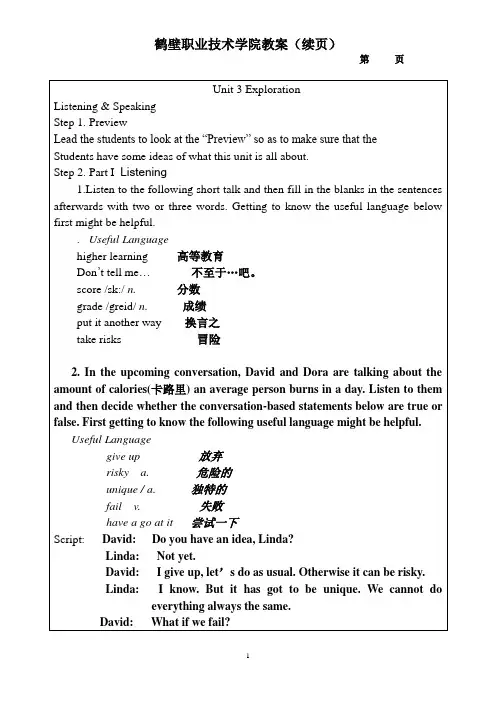
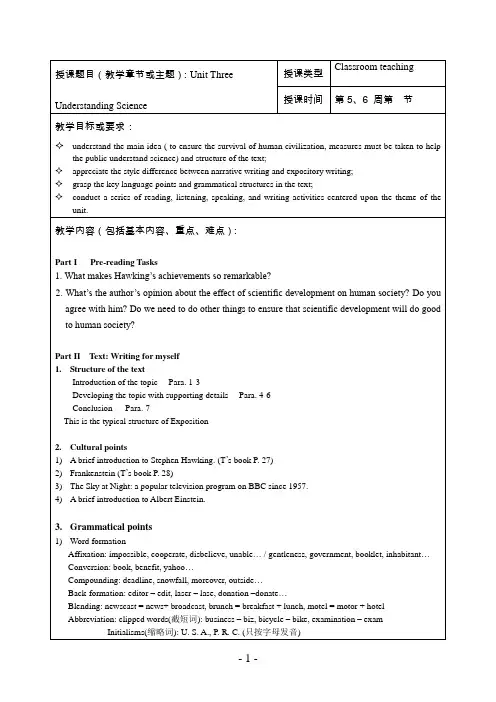
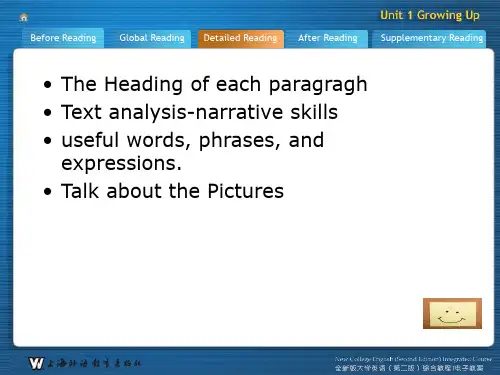
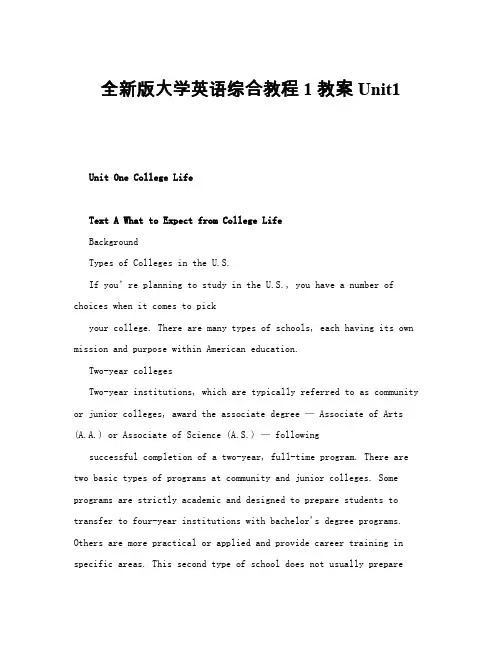
全新版大学英语综合教程1 教案Unit1Unit One College LifeText A What to Expect from College LifeBackgroundTypes of Colleges in the U.S.If you’re planning to study in the U.S., you have a number of choices when it comes to pickyour college. There are many types of schools, each having its own mission and purpose within American education.Two-year collegesTwo-year institutions, which are typically referred to as community or junior colleges, award the associate degree — Associate of Arts (A.A.) or Associate of Science (A.S.) — followingsuccessful completion of a two-year, full-time program. There are two basic types of programs at community and junior colleges. Some programs are strictly academic and designed to prepare students to transfer to four-year institutions with bachelor's degree programs. Others are more practical or applied and provide career training in specific areas. This second type of school does not usually preparestudents for transfer to a four-year institution, though some of the credits earned may still be accepted by a four-year institution.A small number of two-year colleges offer the final two years of the undergraduate program only, awarding the bachelor‘s degree rather than the associate degree. Most community and juniorcolleges are publicly supported by the state and local communities, although some are private. Some private two-year colleges areproprietary or run for a profit.Four-year colleges and universitiesThe college or university (sometimes called an institute when it emphasizes engineering or other technical courses) awards the bachelor's degree. The Bachelor of Arts (B.A.) or Bachelor of Science (B.S.) degrees are the most common, but a variety of bachelor's degrees by other names are also granted. Bachelor's degrees are typically awarded following successful completion of a four-year, full-time program. Programs in some fields of study or at some institutions can be longer than four years. There are both public and private colleges and universities in the United States, and some have an affiliation with a religious denomination.Public versus privatePublicly supported schools are generally state colleges or universities or two-year community colleges. These institutions receive most of their funding from the states in which they are located. Private schools generally have higher costs because they do not receive the sameprimary funding from the state and federal government. Colleges and universities with religious affiliations are private. Most of them are Christian (Roman Catholic and Protestant), although there are a small number of Jewish and Islamic institutions. In most cases, you do not need to be a member of a particular church or religious group to attend a religiously affiliated college and enrollment in these institutions will not usually interfere with your own religious views. Privately owned colleges Proprietary institutions are different from other types of schools in that they are privately owned and run for a profit. They are "educational businesses" that offer services and courses similar to those at other institutions, but you need to be very careful and research their accreditation status. Their programs tend to be technical and pre-professional courses of study.Almost all the colleges in the United States are now coeducational, which means that both men and women attend. There are also a small number of single-sex schools, some for men and some for women. Faculty, administration, and staff members will likely be of both sexes at any college.Words and Expressions1.a little bit有点He was a little bit under the weather. , 他生病了。
课时: 2课时教学目标:1. 知识目标:- 学生能够理解并掌握关于梦想追求的词汇和短语,如pursuit of dreams, hard work, difficulties, achieve等。
- 学生能够识别并运用第一、二人称代词以及相关的连词和介词。
2. 技能目标:- 学生能够通过阅读、讨论和写作等活动,提高英语阅读理解和表达能力。
- 学生能够通过小组合作,提高听说能力和团队合作能力。
3. 情感目标:- 学生能够认识到追求梦想的重要性,并激发他们对未来的憧憬和信心。
- 学生能够学会尊重他人,理解不同文化背景下人们对梦想的追求。
教学重点:1. 理解并运用关于梦想追求的词汇和短语。
2. 提高阅读理解和表达能力。
3. 培养团队合作能力和英语听说能力。
教学难点:1. 理解并运用第一、二人称代词以及相关的连词和介词。
2. 通过小组合作,完成相关任务。
教学过程:第一课时一、导入1. 教师简要介绍本节课的主题:The Pursuit of Dreams(梦想的追求)。
2. 引导学生分享自己或他人的梦想故事。
二、阅读1. 学生阅读课文,了解文章大意。
2. 教师提问,检查学生对文章内容的理解。
三、词汇学习1. 教师讲解本节课的重点词汇和短语,如pursuit of dreams, hard work, difficulties, achieve等。
2. 学生跟读、模仿并运用所学词汇。
四、小组活动1. 将学生分成小组,每组讨论以下问题:- What is your dream?- How do you plan to achieve your dream?- What difficulties may you encounter in pursuing your dream?2. 每组选派一名代表分享讨论结果。
五、总结1. 教师对本节课的内容进行总结,强调追求梦想的重要性。
2. 布置课后作业。
第二课时一、复习1. 教师带领学生复习上一节课的重点词汇和短语。
课时:2课时教学目标:1. 理解并掌握课文中的基本词汇和句型。
2. 能够运用所学词汇和句型进行简单的日常对话。
3. 了解西方文化背景,培养跨文化交际能力。
教学重点:1. 课文中的基本词汇和句型。
2. 文化背景知识。
教学难点:1. 词汇的准确运用。
2. 文化背景知识的理解。
教学准备:1. 课件2. 教材3. 课堂活动材料教学过程:第一课时一、导入1. 播放一段关于英语国家的文化背景视频,让学生初步了解西方文化。
2. 提问:你们对英语国家有哪些了解?二、课文学习1. 学生朗读课文,教师指导发音和语调。
2. 分析课文结构,讲解课文中的重点词汇和句型。
3. 学生跟读课文,巩固所学知识。
三、课堂活动1. 分组讨论:根据课文内容,讨论以下问题:(1)What do you think of the author's attitude towards English learning?(2)How can we improve our English proficiency?2. 角色扮演:学生分组,分别扮演课文中的角色,进行对话练习。
四、总结1. 回顾本节课所学内容,强调重点词汇和句型。
2. 布置课后作业,要求学生完成以下任务:(1)背诵课文中的重点词汇和句型。
(2)查阅资料,了解英语国家的文化背景。
第二课时一、复习1. 回顾上节课所学内容,检查学生的掌握情况。
2. 针对学生的错误,进行讲解和纠正。
二、拓展阅读1. 学生阅读课文后的拓展阅读材料,了解英语国家的文化习俗。
2. 教师讲解拓展阅读材料中的重点内容。
三、课堂活动1. 分组讨论:根据拓展阅读材料,讨论以下问题:(1)What are the similarities and differences between Chinese and English culture?(2)How can we better understand and respect different cultures?2. 角色扮演:学生分组,分别扮演拓展阅读材料中的角色,进行对话练习。
大学英语1课程教案Unit 1 Starting OutTeaching Content:Diary of A FresherLesson Type:Intensive Reading (New Standard College English Book 1)Total Time: 4.5 HoursClass/Object: Freshman (the first term)Teaching Procedures:Step 1Starting Point(15 mins)1。
What do you expect to learn in the university?2。
Work in pairs。
Look at the photo of a university。
Choose words to describe it。
And then think of words to describe your own college。
3. Work in pairs. Brainstorm college education objectives and what are important to you。
☐finding a girlfriend / boyfriend☐studying hard and learning a lot☐meeting people and making friends☐getting a good job when you graduate☐having fun☐growing up and becoming independent☐going to parties☐doing lots of sport☐reading widely☐learning new skills and having new experiencesStep 2Introductory remarks (10 mins)How to write a diary in English1。
大学英语1课程教案Unit 1 Starting OutTeaching Content:Diary of A FresherLesson Type:Intensive Reading (New Standard College English Book 1)Total Time:4。
5 HoursClass/Object:Freshman (the first term)Teaching Procedures:Step 1Starting Point(15 mins)1. What do you expect to learn in the university?2.Work in pairs. Look at the photo of a university. Choose words to describe it.And then think of words to describe your own college。
3. Work in pairs. Brainstorm college education objectives and what are important to you.☐finding a girlfriend / boyfriend☐studying hard and learning a lot☐meeting people and making friends☐getting a good job when you graduate☐having fun☐growing up and becoming independent☐going to parties☐doing lots of sport☐reading widely☐learning new skills and having new experiencesStep 2Introductory remarks (10 mins)How to write a diary in English1. Format:a。
Unit 1 Growing UpI.Teaching plan (5 periods)ObjectivesStudents will be able to:1)grasp the main idea and the structure of the text ( narration in chronological sequence)2)appreciate the narrative skills demonstrated in the text3)master the key language points and grammatical structures in the text4)conduct a series of reading, listening, speaking and writing activities related to the theme ofthe unit.Time allotment1)1st period: pre-reading; while-reading ( text structure, cultural notes, language points)2)2nd period: while-reading (language points)3)3rd period: while-reading (language points, grammatical structures)4)4th period: while-reading (grammatical structures; details; synonyms; coherence) Post-reading(main idea; exercises)5)5th period: check on student‘s home reading (text B) post-reading (theme-related languagelearning tasks)Pre-reading tasks1)Have you listened to John Lennon‘s Beautiful Boy (2 minutes)2)The art of eating spaghetti (15 minutes)3)Tasks students some questions and introduce text A (8 minutest)While-reading tasks1.The grasping the structure of the text: circle all the time words; text organization exercise 2 ;sum up the main idea (15 minutes)2.Cultural background: explaining the American grade school system and how teachers aredressed. (3 minutes)3.Explain language points and gives Ss practice. (60 minutes)4.Explain grammatical structures (25 minutes)5.Text analysis and theme-related language learning tasks (32 minutes)Post-reading tasks1. Think alone: According to Mr. Fleagle, what is the essence of the essay? (5 minutes)2. Check students‘ after-text exercises and solve some common errors (10 minutes)3. Check student‘s home reading (text B) (3 minutes)4. Ss do Part IV: Theme-related Language Learning Tasks in class (1 period)5. Ask t he students‘ to prepare the next unit (2 minutes)I.Text AnalysisRussell Baker is very good at selecting details (see Part IV Writing Strategy) to prove his point. For example, in Para. 2 he creates an unfavorable image of Mr. Fleagle by describing his ―fo rmal, rigid and hopelessly out-of-date‖ eyeglasses, hairstyle, clothes, jaw, nose, and manner of speaking.What‘s more, Russell Baker employs repletion not only to make it easy for readers to follow what he is saying, but also to impress them more deeply. For example, in Para. 2, there are 9 prim’s or primly’s in as few as 3 sentences! Thus readers will have in their mind a vivid picture of what Mr. Fleagle looked like. Another example of such repetition can be found in Para. 5. Count how many I wanted‘s t here are in this paragraph (there are 5!). They help to emphasize Russell Baker‘s strong desire to write for himself.On the other hand, where this stylistic device is not justified, Baker is also expert in avoiding repetition by employing synonymous words and phrases. Here are some examples:a.dull, lifeless, cheerless, tediousb.turn out, write, compose, put downc.recapture, relived.topic, titleII.Cultural notes1.Grade schools in the US.: It is necessary to have some knowledge of grade schools in theU.S. because Ss have to realize that ―the third year in high school‖ (para. 1) equals ―the eleventh grade‖ (para. 9). U.S. students generally go through elementary schools (kindergarten to 5th or 6th grade), middle schools (grades 6-8) or junior highs schools (grades 7-9), and high schools (grades 9-12 or 10-12).2.What American teachers wear in school: Nowadays, people in the U. S. love to dresscausally. Even among those companies with a rigid dress code some now allow employees not to wear suits on Fridays. U.S. teachers were fairly formal clothes to school, but not necessarily suits and ties. Bow ties are considered even more old-fashioned than ties.3.Spaghetti and the proper way of eating it: Spaghetti is the Italian-style thin noodle, cookedb boiling and served with sauce. Usually you would put a fork into a plate of spaghetti, turnthe fork several times so that spaghetti will wind around the fork, then place the fork into your mouth. It‘s impolite to suck.nguage Points1.off and on: adv.In an intermittent manner: slept off and on last night.2.possibility: The fact or state of being possible. Something that is possible.Is it a possibility that you will work abroad?There is no possibility of his coming.The new invention contains wonderful possibilities.3.take hold: to start to have an effectThe fever was beginning to take hold.4.bore: To make weary by being dull, repetitive, or tedious:The play bored us.I'm bored with this job.It's bore to little children having to go to school every day.5.associate: To connect or join together; combine; To connect in the mind or imaginationassociate one thing with anotherWe associate China with the Greet Wall.What do you associate with such a heavy snow?6.assignment: a piece of work that is given to a particular personreceive an assignment接收一项任务What is today's assignment in history?今天历史课指定的作业是什么?He has got a new assignment.他得到一项新任命。